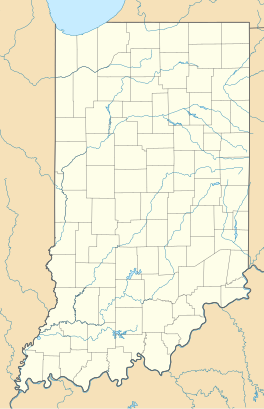Kile Oak Tree
| Kile Oak Tree | |
|---|---|
 | |
| Species | Bur Oak (Quercus macrocarpa) |
| Coordinates | 39°45′46″N 86°03′56″W / 39.762667°N 86.065517°W |
| Height | 87' |
| Girth | 190 inches |
| Diameter | 123' |
The Kile Oak Tree is a bur oak tree that is a landmark in the historic district of Irvington in Indianapolis, Indiana.[1] The Kile Oak Tree is preserved by the Irvington Historical Society and Irvington Historical Landmarks Foundation. The Kile Oak Tree is assumed to be "somewhere between 300 and 500 years old" and is one of the oldest trees in the city of Indianapolis.[2][3][4]
History and preservation
[edit]The Kile Oak Tree does not have a date recorded for when it was planted. It's been estimated by Arborists that the Kile Oak Tree has been growing since before America was established. [3]
The oak tree is named after Rev. Oliver Kile, who lived at 5939 Beechwood Avenue and died in 1924.[5][2] After his death, his daughter, Mae Kile, campaigned to protect the tree for decades while living in the house her father built next to it.[2] In her campaign to protect the tree, Mae invited guests to the property and kept a guestbook for the Oak Tree, where visitors would record their names when visiting the site of the tree.[6][2] Within the guestbook there are signatures from international guests from China and India.[3] This guestbook was created in 1928 and is now kept by the Irvington Historical Society.[7] Mae fought to protect the Kile Oak Tree until her death. In 1973, after her death, the property was purchased by the Irvington Historical Society.[8][2]
Fencing was added around the tree by Keep Indianapolis Beautiful in the Project 180/IPL Revive a Neighborhood 2001 projects.[9]
The site of the Kile Oak Tree is currently maintained by volunteers.[5]
In September 2024, the Kile Oak Tree sustained damage from storms caused by Hurricane Helene and was temporarily closed off due to safety concerns. After damaged branches were removed, the gates were opened back up.[10]
Honors and awards
[edit]The Kile Oak Tree has been honored with two plaques. In 1973, the tree received a plaque in recognition from the Indiana Arborist Association.[2] Then in 1976, the tree received a plaque as "Bicentennial Tree of the Year" in joint recognition from the International Society of Arboriculture and the National Arborist Association for having "lived here during the American Revolutionary Period."
See also
[edit]References
[edit]- ^ "Kile Oak". IRV Garden Club 1. Retrieved 2024-01-20.
- ^ a b c d e f Martin, Ryan. "How an Indianapolis neighborhood came to protect the centuries-old Kile Oak". The Indianapolis Star. Retrieved 2024-01-20.
- ^ a b c "Indianapolis Times 9 September 1951 — Hoosier State Chronicles: Indiana's Digital Historic Newspaper Program". newspapers.library.in.gov. Retrieved 2024-01-20.
- ^ "Tree planting crusades in Indy, beginning in 1850s". hoosierhistorylive.org. Retrieved 2024-01-20.
- ^ a b Kingsbury, Amanda. "Staff Best Things: Best tree to sit under and contemplate your dharma". The Indianapolis Star. Retrieved 2024-10-03.
- ^ "Kile Oak in Irvington". The Indianapolis News. 1933-12-05. p. 5. Retrieved 2024-01-20.
- ^ Martin, Mykal McEldowney and Ryan. "A historic look at the massive Kile Oak in Irvington". The Indianapolis Star. Retrieved 2024-01-20.
- ^ "Kile Oak". Irvington Historical Society. Retrieved 2024-10-03.
- ^ "Indianapolis Recorder 18 May 2001 — Hoosier State Chronicles: Indiana's Digital Historic Newspaper Program". newspapers.library.in.gov. Retrieved 2024-10-03.
- ^ Benson, Darian (2024-10-25). "Arborists work to ensure Irvington's Kile Oak continues to stand tall". Mirror Indy. Retrieved 2025-01-06.

